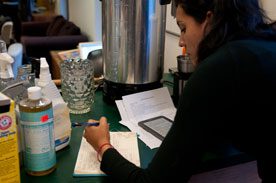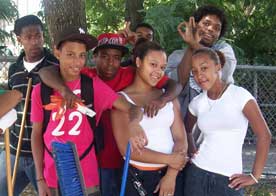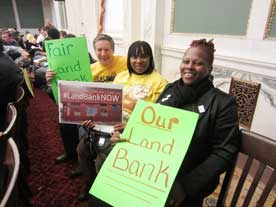Sunset Park is a diverse, densely populated, low-income neighborhood in south Brooklyn. For decades, this community has been a first destination for waves of new immigrants from around the world. Almost half, 45 percent, of community residents were born outside the United States, coming to New York from Puerto Rico and the Dominican Republic, Central and South America, China, the Middle East, and Europe. Seventy-two percent of them speak a language at home other than English. For many Sunset Park immigrants, overcoming a triangle of limitations—limited literacy in English, limited education, and limited work history outside of agriculture or trade—makes it very challenging to get jobs that pay a decent wage. Twenty-three percent of Sunset Park residents and a third of neighborhood children live in poverty.
The Center for Family Life is a neighborhood-based social service organization in Sunset Park, first established in 1978. Today, our comprehensive programs in counseling, employment, education, the arts, and recreation engage more than 13,000 children and adults each year at seven community locations in Sunset Park. For over
20 years, CFL’s Adult Employment Program has been providing community residents with job readiness training by helping them update their resumes, teaching job search techniques, preparing clients for interviews, enhancing computer skills, providing English for Speakers of Other Languages classes, and securing interviews with potential employers.
But over the last decade, CFL staff began to confront the hard fact that there were many people seeking employment assistance that we were unable to enroll in our program because they didn’t meet program requirements. Many of these residents had limited English language skills, most were low-skilled workers, few had computer skills, and many were working out their immigration status. Many of these low-skilled workers were employed in textile factories, provided domestic services, or worked in restaurants.
Confronted with all of these issues, CFL staff began to research alternatives to the traditional job readiness model that CFL had been using for over 20 years. While researching, one of our social workers came across examples of immigrant-run, worker-owned cooperatives: California’s Women’s Action to Gain Economic Security (WAGES), UNITY Housecleaners Cooperative in Long Island, and Las Señoras of St. Mary in Staten Island. These businesses were an enormous inspiration and motivation for us.
We approached the un- and underemployed women who had been participating in ESOL classes and receiving family counseling at CFL and proposed the cooperative model as a means to create meaningful and living wage jobs. Most of the women excitedly agreed to participate.
In 2006, CFL staffers launched a 12-week training, creating a curriculum based on previous observations, research, and CFL’s previous organizing experience. At the time there were few options out there for cooperative development and training of the sort we wanted to do.
The commitment, drive, and enthusiasm that the women expressed as we discussed the prospects of creating a cleaning cooperative sparked a long-term commitment by CFL to invest in a cooperative development program. One of the challenges that CFL’s new co-op program staff faced was getting CFL’s Adult Education Program staff on board with supporting the cooperative by answering client calls and managing their co-op work schedules. Some of the staff had never heard of a cooperative and expressed doubt about its potential success and usefulness for generating income. However, for the immigrant women developing the cooperative business, cooperatives were not a new concept. In their countries of origin, the women had either participated in one or at least had heard of credit unions, manufacturing co-ops, or other cooperative enterprise.
During the 12-week training some women left the cooperative because they realized being a business owner was not for them, or because they felt that the process of creating the cooperative was taking too long, and they need to generate income more rapidly.
Initial challenges notwithstanding, Sí Se Puede! (Yes We Can!) Cleaning Cooperative opened for business in 2006. CFL “incubated” the cooperative—providing office space, technical and financial assistance, and mentoring until it could function on its own. Having the co-op incubator as an integral part of the inner workings of CFL permits us to refer co-op members to any service that they may need, such as family counseling, after-school programs, and workplace-specific ESOL classes to enable effective on-the-job communication.
In the first year of the co-op’s operation, one of the main challenges for the women was dedicating many hours without pay (“sweat equity”) to develop the core of the business through planning meetings and marketing.Another great challenge was learning to work together to make decisions while maintaining professionalism. This continues to be a learning process for many members, although co-op cohesion has improved tremendously in the last five years. These challenges were overcome with an increase in clients after the first year and multiple trainings on developing effective communication.
The struggles were well worth it for women like Cristina from Mexico, who had been unable to find a decent paying house-cleaning job since she arrived in the United States four years ago. She was a single mother with a two-year-old daughter, and her bills were stacking up. Once she started to work with Sí Se Puede! she began to earn $20/hour and could rely on steady work on a weekly basis.
Once Sí Se Puede! women were ready to incorporate their business, attorneys were able to present to them a legal structure that accommodated their approach and needs. The Sí Se Puede! co-op is incorporated as a not-for-profit cooperative corporation which allows job referrals to come from the CFL office, while all decisions, big and small, are made by the entire membership using both consensus and majority vote (depending on the time available and size/impact of the decision). The model allows for flexibility in individual work arrangements while still maintaining complete member control over the operations and decisions of the business.
Since June 2006, Sí Se Puede! has grown from 15 to 51 members. Sí Se Puede! has developed its own bylaws with the assistance of the Urban Justice Center, incorporated through New York state, built its client base to over 1,000 households and offices, and established a cohesive and growing member base with little turnover. Its members make an average of $20/hour at the co-op, as compared to $7–8/hour at previous jobs.
Despite, or perhaps because of, its higher wages, Sí Se Puede is competitive in the marketplace, because there are no middlemen involved.
A Co-op Development Niche
CFL has gone on to help launch many more cooperatives anchored in Sunset Park—in child care, pet sitting, interior painting, elder care, catering, and more—and has developed a co-op development model that addresses the particular needs and characteristics of the immigrant community that we work with.
Our model includes suggesting ideas for co-ops to groups of our clients based on types of businesses they already have experience with, such as cleaning and childcare, recognizing and maximizing members’ strengths and abilities. It’s very intensive work, so we can only work on launching one co-op at a time.
As a co-op incubator, CFL’s Co-op Program staff work closely with each co-op for up to three years, attending meetings, assisting with office management, and providing trainings and general consultation as issues arise. The main business expenses that the co-op may have, such as office space, office manager salary, and printing are covered through CFL until the co-op has become financially self-sufficient. One of the most important aspects of CFL’s assistance is teaching co-ops how to conduct meetings, communicate effectively, and build a professional business environment that constantly considers client satisfaction and quality service.
The culture and structure of each co-op are developed to take into account the needs of the members. For example, jobs are assigned to members who are available and interested in the particular type of work offered. This has allowed members to move from a fixed 9 am to 5 pm schedule to a more flexible one and have more time for their children and families. Furthermore, all the cooperatives provide childcare during their meetings to facilitate the participation of members who have young children.
Some of the biggest challenges for members prior to joining the co-op were isolation, exploitative workplaces, and lack of contracts. Our model focuses deeply on these issues and makes them a priority when developing the mission statements and goals of each co-op business.
For example, the Beyond Care Childcare Cooperative has developed a thorough contract based on contracts created by Domestic Workers United, a New York–based cooperative. The contract outlines topics such as the duties members are responsible for, vacation days, sick days, overtime pay, and cancellation fees. The contract, along with building a respectful and trusting relationship between the member and the client, helps Beyond Care fulfill its mission of creating a “safe and healthy working environment.” For example, one clause of the contract states, “Client understands that labor laws, regardless of race, gender, immigration status, age, sexual orientation or religion, protect members.”
A unique aspect of our co-op development model is the significant emphasis we place on group work. As a social worker who specializes in social group work, community organizing, and leadership development, I have worked with my team to develop a model that values and prioritizes effective communication, compassion, active listening, consensus decision-making, and skillful facilitation. We believe that these skills are fundamental to sustaining relationships and trust within a cooperative business. During the initial 12-week training with each cooperative, CFL staff co-facilitate meetings to model desired skills. We have observed that for the immigrant women in the cooperatives, modeling how to work in a professional manner within a group setting while using the skills that are taught in the initial training is a practical and effective way of using ourselves as their consultants.
Another aspect of the social group work method is allowing members to resolve conflicts within the group. For instance, in one co-op meeting the members addressed a person’s constant tardiness to the general meeting. The member had the opportunity to explain her reasons for being late. The members responded by brainstorming ideas on how their fellow member could adjust her schedule to be able to arrive to meetings on time. There is an emphasis on holding one another accountable and talking through issues to reach a resolution within the group and with the leadership committee. Valuing open discussion promotes transparency and reliance on the group process.






Comments